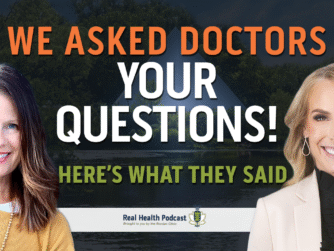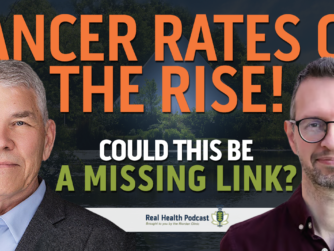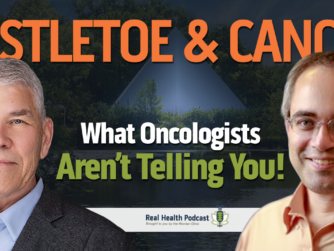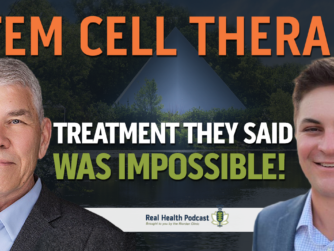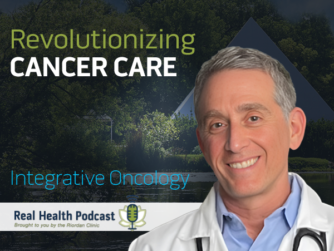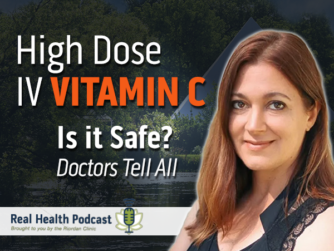This episode is the first in a series introducing the providers at Riordan Clinic.
Dr. Ron Hunninghake is the Chief Medical Officer and Healthcare provider at the Wichita, KS location. He has been with Riordan Clinic for over 30 years and is a wealth of knowledge on all things nutrition, healthy living, and recovering from chronic illness. In this episode he shares his journey to wellness and how he helps the patients he serves.
Thank you to this Episode’s Sponsor
Episode Transcripts
Intro This is the Real Health podcast brought to you by Riordan Clinic. Our mission is to bring you the latest information and top experts in functional and integrative medicine to help you make informed decisions on your path to real health.
Leah Chischilly Welcome everyone to the Real Health podcast. I am joined today with Dr. Ron Hunninghake, and he is the chief medical officer here at Riordan clinic. And we’re just going to talk about what real health means, why we decided to start this podcast and just a little bit of his history here at the clinic. So welcome Dr. Ron!
Dr. Ron Thank you so much for this opportunity to let people know more about what we do here.
Leah Chischilly Yeah. I’m so happy that you’re here. Always. We have the privilege of working with one another and it is an honor. Um, so tell me a little bit about your history. I know you’ve been with Riordan clinic for a very, very long time. So just tell me a little bit about that.
Dr. Ron Well, 31 years sounds like a long time, but I can tell you it went by like that [snaps fingers.] And so I’m always amazed that time can pass that fast, but I think it’s a good sign because it means that, what’s that saying? Time flies when you’re having fun? People keep saying, are you going to retire? Are you going to retire? And I said, I’m having too much fun. I can’t retire!
I’ve learned so much here and the beauty of the whole concept of real health and working with patients in that discovery process, because real health is a very personal thing. It’s unique to each individual. When I work with people where we’re working as co-learners, we’re learning about what’s real health for them. What’s real health for you and what’s real health for me is going to be different because biochemically we’re so unique, we’re so special.
And then when you get into the story of each person’s illness there’s a unique path that they have followed that has been filled with good things and adversities as well. There’s their genetics, there’s their diet, there’s their relationships. And so real health is a very fertile ground in which you can start to investigate root causes. And once you identify root causes, then you have a pathway to better health..
Leah Chischilly Yeah. That’s wonderful. Can you share, do you have your own experience with real health and what that is for you?
Dr. Ron Yeah, so like most of the people that come to the Riordan clinic, I had my trials and tribulations. I was a family doctor in Salina, Kansas, very busy, a brand-new family, four kids. My wife was a teacher still is a teacher, we were all so busy. And yet in family medicine, I would get nighttime calls. It was a small practice, very busy practice and I was tired a lot. I had poor habits. I was a Pop-o- holic at that time, a diet pop-o- holic, which is even worse! Poor sleep. I did have some good habits. I was a runner and I was a regular meditator. And I had some understanding about diet and good health. And fortunately the program that I was in at Salina family physicians had a wellness program. So that was my incentive to learn more about better health. And so it wasn’t hard to make the jump to the Riordan clinic. When Dr. Riordan and I met and he found out that I was into wellness, he said “why don’t you come down here, and let’s talk about what we’re doing here in helping people achieve a higher level of wellness?” So that was my story of how I got here.
Leah Chischilly Yeah. I think it’s always kind of nice to hear that our doctors are humans too, and they have their own health stuff going on, and that you’ve taken the time to overcome that on your own. I think, although your credentials obviously lend to your credibility, I think that your story does too, even more so.
Dr. Ron And it’s an ongoing story. I mean, it’s not like I’ve achieved final good health. I’m older than I used to be. I’ve learned by working with patients here that toxic elements can build up in the body. So there’s a process of detoxification that always needs to be occurring. I’m learning the importance of a good night’s sleep and that gets trickier as you get older. My dad was a heavy snorer, so I had to overcome the snoring issue. As for dietary factors probably I’m doing better in that than I’ve done in a long time.
Fortunately, my wife and I worked together and because of her being a teacher, I’ve actually taken the role of chef. And I encourage all the guys out there to discover your inner chef because when you start cooking for yourself you really understand that there are choices that need to be made at the grocery store. That’s where your true good food choices begin is when you buy the food, and whatever you buy, you’re probably gonna eat. So make a good choice at the grocery store. And then just learning how to prepare not only healthy foods, but really good tasting meals. And so that’s been fun discovery process.
Ad There’s a lot more to this conversation and it’s coming up right after the break
Today’s episode of the Real Health Podcast is brought to you by the Riordan Clinic Nutrient Store. The nutrient store is your resource for the highest quality nutritional supplements. Every supplement in the store is handpicked by the expert medical staff at Riordan clinic, providing you with the best quality purity, consistency, and effective dosing available visit store.Riordanclinic.org to shop online.
Dr. Ron It really started about a year and a half ago. My wife has vitiligo, which is an autoimmune disease of the skin. And we had read Steven Gundry’s book on the plant paradox, and we decided we would do this together, but because of her teaching timeframe, she could not be home. I got home before her. So she asked if I would try to do this. And so I discovered some very simple cooking techniques that allowed us to use the type of foods that he was recommending. And that kind of started a whole chain of discoveries in terms of how to quickly prepare a really healthy meal that would be right there and ready to go when she got home. So I got a lot of feedback from her. She loved the fact that I was doing the cooking for her. I’m her personal chef now, by the way. And so all these kinds of things, this is the discovery of real health. You know, health is not a burden. Health can be fun. Health can be, an opportunity to grow new skills in your life. And so you don’t ever want to feel like life is over that you’ve learned everything you need to learn, because there’s always so much more that can be incorporated into a healthy lifestyle.
Leah Chischilly Yeah. I love that advice. That health is something that’s built over time and that there’s always something to learn. Now, I know, just speaking a normal person perspective, there’s so much information obviously about health and wellness now, and it can feel really overwhelming. How would you advise someone to get past the overwhelm and to be able to get started working toward real health?
Dr. Ron Well, Dr. Riordan’s basic idea was, there’s a lot of people doing functional medicine and the original name of the Riordan clinic was the Center for the Improvement of Human Functioning. His idea was that if you measure things, that can give you a baseline and then if that’s not what you want it to be, or it doesn’t seem like it’s optimal, then you make a plan to make it better. Then down the road you remeasure. And so that way you’re using yourself as a reference point. If you’re trying to do it like someone else did it, it may be tricky because you’re trying to just imitate another person. In this approach you’re getting your own baseline. You’re developing, oftentimes with help, a plan for how to get from point A to point B. It’s always kind of fun when people get their original test results back and we make a plan and then I’ll say, okay, now in three months, we need to remeasure these things to see if you’re actually improving. That is very powerful motivation for people. It’s not me saying you need to get better, or they’re not having someone else from the outside beat them up or punishing yourself into improvement. It’s more rewarding yourself with a metric that shows that you really have made progress. Even if it’s a little progress that’s progress.
Leah Chischilly Yeah, it is progress. So I have my own opinion. But how important would you say that it is someone has help in the process of getting well?
Dr. Ron How important is it to have help? Well, you know, I look back on my life and I’ve had so many important mentors in my life, teachers, my parents, the principal of my school, Sister Pier, “Powerful Pier.” She was someone that I thought I didn’t like, but looking back, she was a very important person in my life. And you can just go down the line, people that have helped you or me to be more than what we were. And so I think we live in a world that we need help. We need good mentors, not someone who’s going to do it for us, but someone who can kind of lay out a path and give us some encouragement. And also if someone is living that life, walking that walk, it encourages you to believe that you can do it too. You can make it too. So a lot of what I do here is it’s part doctor, but it’s also part cheerleader, you know, trying to encourage patients to go for it. Hey, this is your opportunity to excel and to overcome your illness through a process of gaining better health. You’re not treating the disease you’re going for better. And it’s interesting that as you get healthier, the disease just kind of becomes less.
Leah Chischilly Hmm. I love that approach. I think that’s so wise. So as just a takeaway from this episode. What would you tell our listeners is the first step toward finding real health.
Dr. Ron You have to have a willingness to change and to expect yourself to do better. And it’s like the little locomotive, I can do it. I can do it. I can do it. You know, you got to get up that hill. And so having that expectation of change for the better is a crucial first step. And then the second step is I think having someone who will be a support to you and that can help you discern whether or not you really are making progress.
Leah Chischilly I love it. That’s great. Thank you so much, Dr. Ron, I really appreciate this today and hopefully it’s been a help to all of our listeners and we will see you in the next episode.
Outro Thank you for listening to the real health podcast. If you enjoyed this episode, be sure to subscribe and leave us a review. You can also find all of the episodes and show notes over at realhealthpodcasts.org. Also be sure to visit Riordanclinic.org, where you will find hundreds of videos and articles to help you create your own version of real health.


